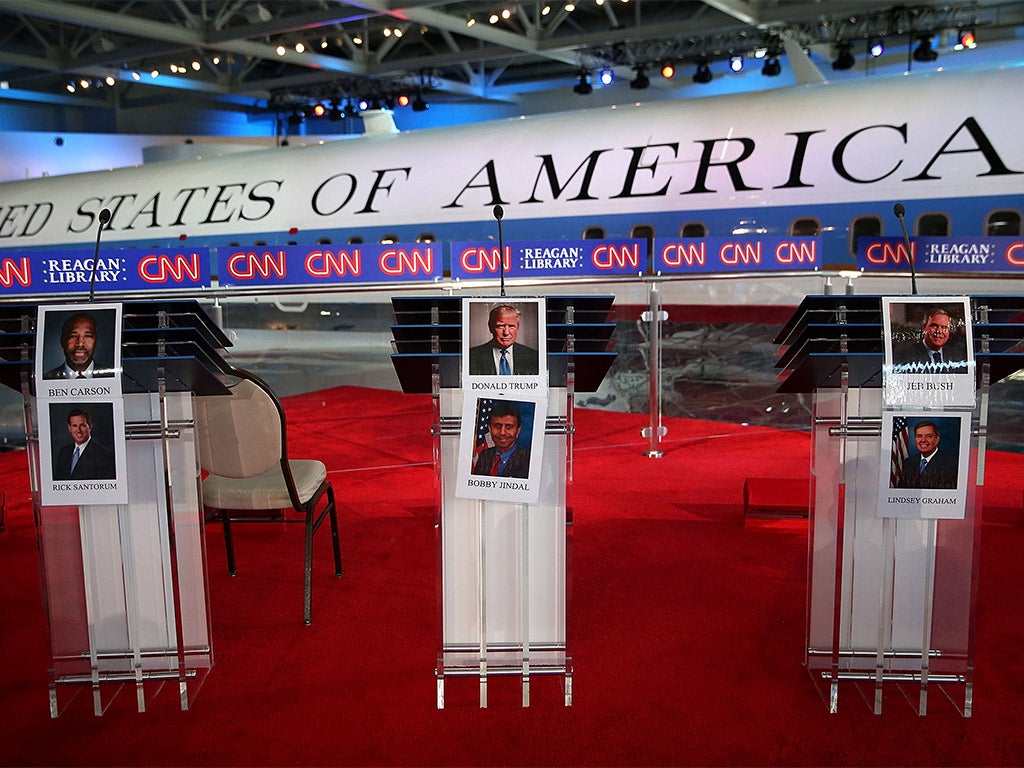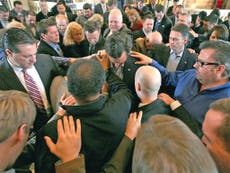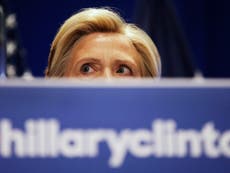In the US, contempt for mainstream politics is abundant - which means anything could happen
Conventional wisdom says contempt with Washington is weaker than hatred for the other side, so tribalism ultimately defeats the desire for outsider candidates


I met Christopher last week in a café in central Texas, a smart young man with unfulfilled ambitions. “I’m basically a traveller who wanted to see the world but got stuck here,” he said. The Republican presidential debate was due to follow that night. Since he followed the news, I asked who he would support. “Oh no, I’m not voting for anybody,” he replied. “They’re all the same – just a bunch of liars.”
I heard the same depressing refrain all week, from young and old, from rich and poor, from judges to students to taxi drivers. They all say the same: the system is broken; money dominates politics; Washington is full of shysters; there is little point in voting. Voters are seething with fury against the failed “establishment” – whether that establishment is Wall Street, widening inequality and billionaires buying influence, or a “left-wing” President, immigration and the inability of political classes to protect ordinary people.
This is the prism through which early skirmishes in the White House race must be seen. It explains why someone so ludicrous, sexist and xenophobic as Donald Trump can set the pace in the Republican fight to run the world’s most powerful nation, despite an inability to distinguish between Hamas and Hizbollah. It explains why rising in the polls behind him is Ben Carson, a doctor who argues Obama’s health reforms were the worst thing for his nation since slavery. And why, for the Democrats, Bernie Sanders – a socialist long seen as a fringe maverick – is now mounting a serious challenge to Hillary Clinton.
This intense rage against the Washington machine also explains conversations such as one I had with a thoughtful computer science student from New York. He described himself as a swing voter, liberal on social issues and conservative on fiscal matters, and it was clear he followed politics avidly as we discussed the Republican race. Yet when I asked how he was going to vote, he said he was swaying towards Sanders “to screw the system”.
Sadly, it is hard to defeat such cynicism when you observe a cautious, money-drenched Democratic front-runner in action amid the email scandal that has ensnared her candidacy. The most interesting of Carly Fiorina’s fine zingers at last week’s debate was, if you want to stump a Democrat “ask them to name an accomplishment of Hillary Clinton”. This may not have had the immediate impact of her crushing put-down of Trump’s insult over her looks, but as several analysts pointed out, it is a portent of her party’s powerful attack line on their most likely opponent. And it is a hard question to answer convincingly.
After her steely performance, Fiorina is the talk of the town, a potential party saviour. “She’ll make a good vice-president,” one admiring Republican veteran told me on Friday, pointing to her mastery of detail. Certainly this made welcome contrast to some of her woeful rivals.
Yet her fans seem undeterred by a dismal track record as the overpaid boss of a company, overseeing a disastrous merger and laying off 30,000 people – precisely the kind of behaviour that causes despondency in middle America. It is worth noting that, according to figures from the Brookings Institution, the average male worker in the US earned less last year in real terms than his counterpart four decades earlier.
Unfortunately, that debate was a poor advertisement for the American political system, with its 11 candidates bickering and simpering for three hours. The discussion was infantile on immigration, frightening on foreign policy and allowed Trump to promote the lethal myth that vaccines spread autism. Yet it was so dire that it also took Trump to inject something sensible on economic issues when he scorned Carson’s claim that progressive taxation was socialist – adding, rightly, it was unfair that so many of the ultra-rich avoid tax.
A short while back I had dinner with one of those candidates. I left struck by his sharp intellect, moderation and open mind, after discussions over what the Republicans have in common with British Conservatives. He was keen to learn lessons on how to win the centre ground and woo back alienated voters among the young and ethnic minorities. Yet, there he was, backing the daft idea of a 2,000-mile fence to stop migrants along the Mexican border and spouting silliness on the environment.
I watched the debate with some Texan Republicans; inevitably, they cheered when Jeb Bush – one of the more serious candidates on display – claimed his brother kept their country safe. This is, of course, the same brother who invaded Iraq and shook up the Middle East with such tragic consequences, and whose actions spawned the “barbarians” of Islamic State that his rivals loudly insisted must be hunted down to protect America.
Now Joe Biden, a two-time loser, is suddenly seen as a potential Democrat winner. But is it any wonder there is such widespread anger with Washington, especially as an absurd row over abortion threatens to shut down government again? Poll after poll shows the depth of American despair over their tarnished democracy, especially on the right, where a majority wants to see the election of an outsider to shatter the system. This is why Trump can say such offensive and stupid things while Carson can waffle on so inconsequentially, yet still the pair float high in the polls while Sanders collects celebrity endorsements.
Conventional wisdom says contempt with Washington is weaker than hatred for the other side, so tribalism ultimately defeats the desire for outsider candidates. The former White House adviser Karl Rove pointed out that at this stage in the last race Texan governor Rick Perry led the Republican race with Herman Cain, Newt Gingrich and Rick Santorum still to succeed him as front-runners before the selection of Mitt Romney.
But, as we have just seen with Labour’s leadership election, these are volatile times. When people lose faith in mainstream politicians, anything can happen.



Join our commenting forum
Join thought-provoking conversations, follow other Independent readers and see their replies